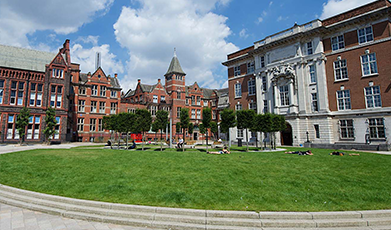Where can I study orthoptics?
To qualify as an orthoptist in the UK, you will need to complete a degree in orthoptics at one of the following Higher Education institutions:
Postgraduate routes
If you already have an undergraduate degree in a relevant subject (such as biological sciences, chemistry, nursing or psychology), you can now take a two year MSc course at UCL or the University of Liverpool, providing the same essential knowledge and skills via an accelerated route.
What is the course like?
The Orthoptic undergraduate degree is a full-time 3 year course in England and 4 years in Scotland. It is a ‘hands on course’ where you will be going on clinical placements at different hospitals during you studies. This means you will be learning and developing your clinical skills in a hospital environment, and assess and manage patients.
The MSc routes offer the same mix of teaching, supported through clinical placements over two years.
During your studies to become an orthoptist, you will develop interpersonal and communication skills to enable you to provide excellent patient care. You will study subjects relevant to orthoptics including anatomy, physiology, ocular conditions and diseases, optics, and research. An interest in science subjects is essential.
Clinical Placements
Throughout the Orthoptic degree you will go on clinical placements at different hospitals. This will give you an opportunity to develop your clinical and interpersonal skills. At each placement a clinical tutor will support you. They will help you to improve your skills to become a competent clinician and guide you in assessing, diagnosing and treating patients of all ages.
The clinical placements are located at hospitals across the country (See our interactive map).
Graduates leave university with a professional and vocational qualification which enables them to practice as an orthoptist straight away.
What will the course cost?
The costs vary depending on which university you choose and if you are a UK, EU or International student. Please check the university websites for more detail.
- University of Sheffield: https://www.sheffield.ac.uk/medicine/prospective_ug/bmedsci/fees
- University of Liverpool: https://www.liverpool.ac.uk/study/undergraduate/courses/orthoptics-bsc-hons/fees-finance/
- Glasgow Caledonian University: https://www.gcu.ac.uk/study/courses/details/index.php/P02367/Orthoptics/#Feesandfunding
- UCL: https://www.ucl.ac.uk/prospective-students/graduate/taught-degrees/orthoptics-pre-registration-msc
However there are various options available to help to make this affordable. You can find out more about student loans and other forms of available funding here.
Open Days
The universities run open days for prospective students to find out more about the orthoptic degree and studying at university.
- University of Sheffield: https://www.sheffield.ac.uk/undergraduate/opendays
- University of Liverpool: https://www.liverpool.ac.uk/study/undergraduate/open-days-and-visits/
- Glasgow Caledonian University: https://www.gcu.ac.uk/study/opendaysandtours/
- UCL: https://www.ucl.ac.uk/prospective-students/graduate/events-and-open-days
There are careers events taking place across England where Health Careers NHS Health Education England participate: https://www.healthcareers.nhs.uk/career-planning/events
UCAS also runs a number of career exhibitions across UK: https://www.ucas.com/ucas/events-exhibitions



